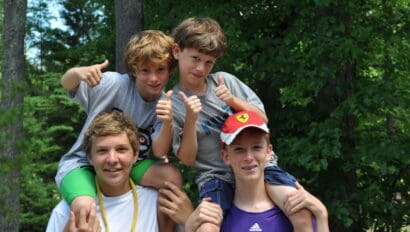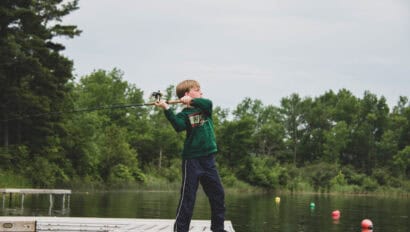Rocking the Stage: How anxious feelings are turned into lifelong skills at summer camp
Battle of the Bands is one of the liveliest evenings for the campers and staff at Camp Chippewa. Cass Court or Knutson Hall will transform into a jam-packed venue with each cabin group taking the stage to ‘lip sync’ a song. During each performance, the audience listens to great music, dances, sings along, and typically laughs to the point of tears (comedy takes center stage during most performances). Is Battle of the Bands fun? Absolutely! But there is a reason beyond levity for this activity at camp.
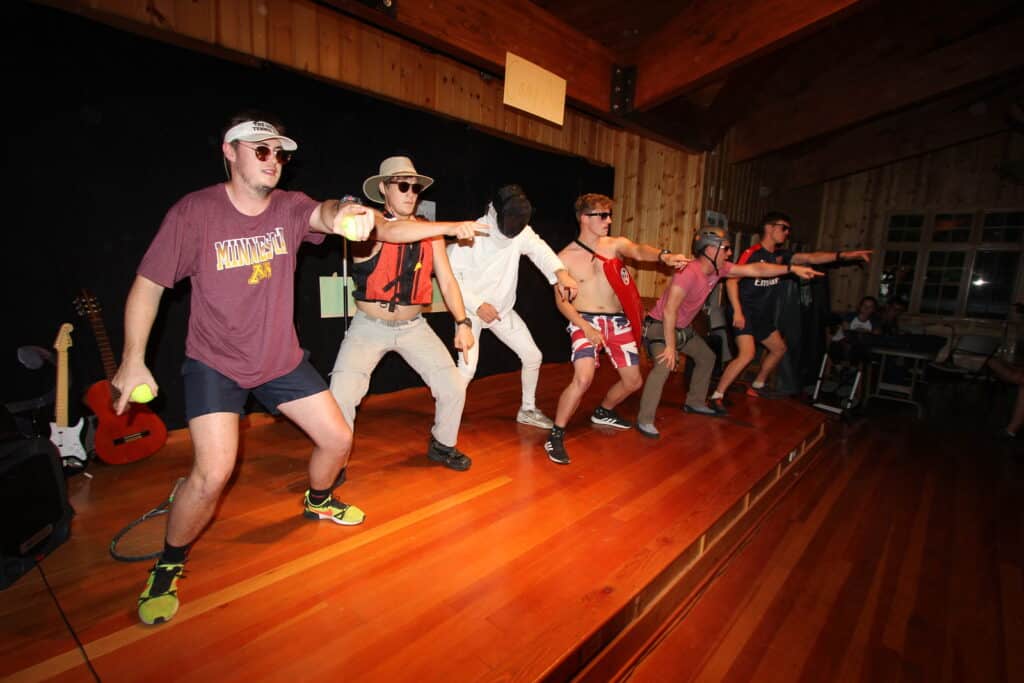
Learning to work together
Leading up to Battle of the Bands performances, cabin groups each select and practice a chosen song. Performances are as varied as the boys’ styles of humor, but all involve group choreography, acting, and some storytelling. The selection process, however, can be tricky for some cabins. Battle of the Bands occurs during the first week of camp, when summer camp can still feel like a new experience for many campers – they are still learning about their cabinmates and learning new names and faces at Camp. Even newer counselors are still experiencing the evolution of camp becoming home.
With new relationship dynamics to navigate, song selection can be tricky. Six to eight boys must collectively decide what the cabin should do. Learning to work together is crucial for a successful Battle of the Bands performance. Under the gentle guidance of their counselors, camper practices teambuilding and social skills that are essential both in and out of camp:
1. Clear communication: People have different viewpoints – that’s a part of life. Clearly communicating your ideas without getting upset is important, while listening to others and not talking over one another can ensure that everyone’s voice gets heard.
2. Solving problems: Understanding that you are in this team together and that every team member shares the same problem (in this case, performing at Battle of the Bands) can help to achieve the desired results. Identifying a shared mission and cooperating to achieve it is integral to being human!
3. Learning responsibility: As a member of a team, others will rely on you to fulfill your role. Campers practice staying accountable and focused.
4. Trusting others: Everyone has a role, and learning to trust others is important in building relationships, building a strong community, reducing stress, and working together. Independence is important, but you need interdependence to thrive in teams, jobs, and relationships.
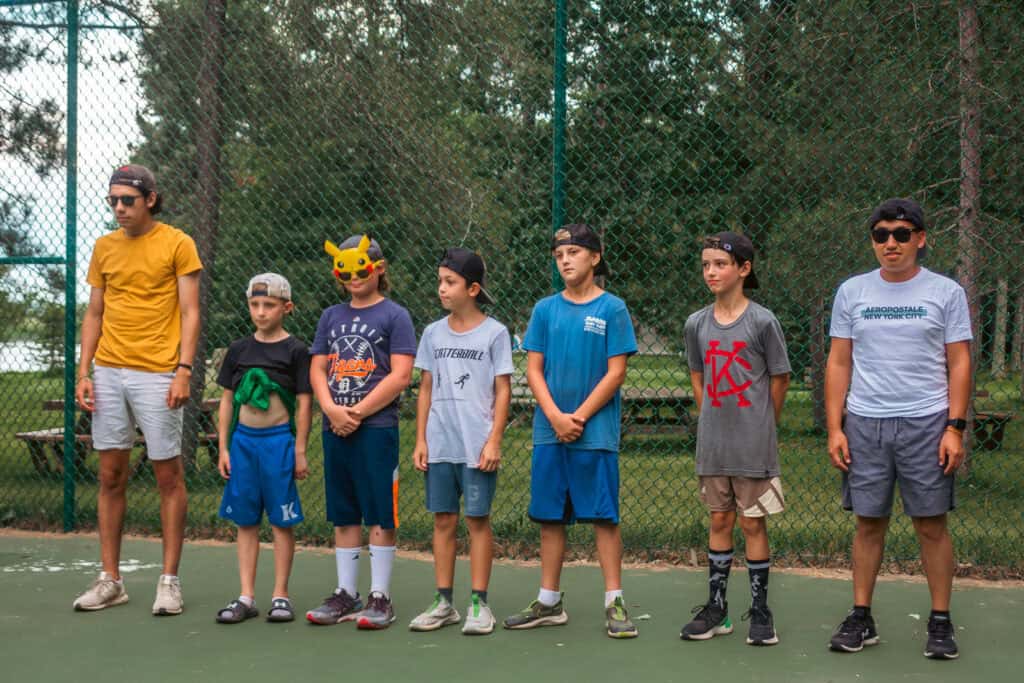
Retraining the brain to step into tough situations
Practice is complete. The boys finish dinner, and sit down in the audience, excited for the Battle of the Bands performances to begin. Then, inevitably, it is their cabin’s turn to perform. Hands are sweaty, stomachs do little turns, and the boys are sure they don’t want to go up on stage! For the campers, this (or maybe the whole process) can be an “I don’t want to do this anymore” experience. Fear of being judged, pressure to perform, and good old self-doubt combine and swirl in their heads. Fortunately, what we know about youth development and anxiety prevention tells us this yucky, anxious cocktail of sympathetic nervous system activation is the perfect way to grow! Therapist Lynn Lyons’ Four B’s of protective childhood experiences neatly frames how experiences like performing at Battle of the Bands are so effective at helping kids grow:
1. Body: When you are nervous about something, it is normal to feel some effects in your body. Butterflies in your stomach, sweaty palms, or tight chests tell you that you are gearing up for something challenging and exciting.
2. Brain: Everyone has a part of their brain that creates worry. It is okay when this part of the brain turns on – you will learn how to work through it.
3. Bravery: You must do things that make you uncomfortable. That is how you become brave.
4. Bridge: Having felt nervous and done something challenging, the next time you feel anxious, you’ll know that you can do it!
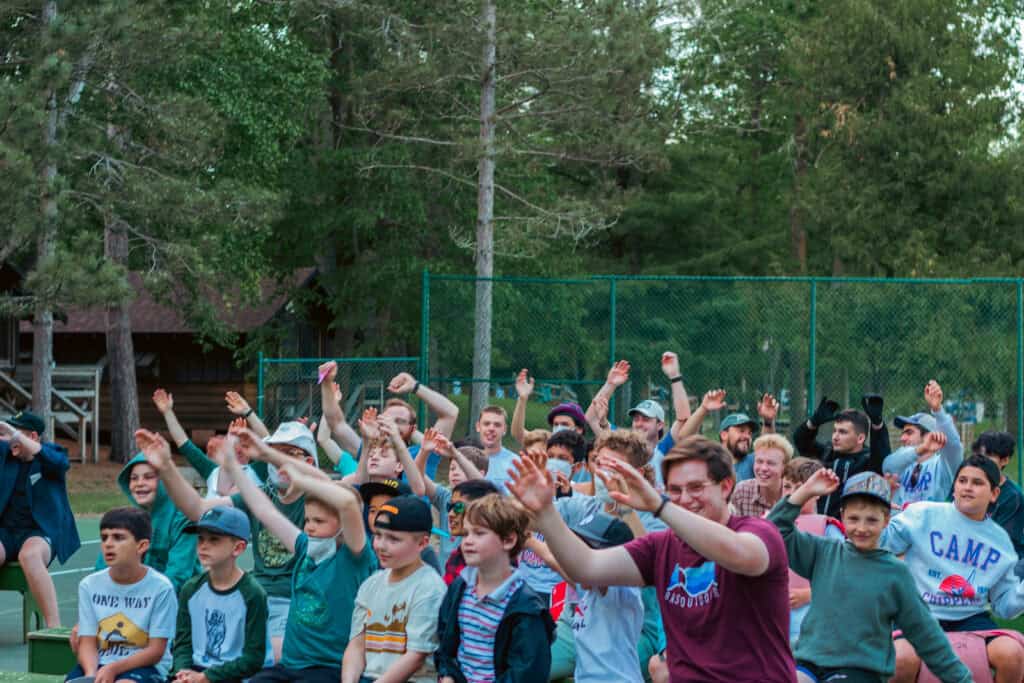
Being supported to grow
Camp Chippewa’s counselors supervise and guide the campers’ growth. One critical element for all staff hired at Chippewa is a genuine desire to be a positive role model for young people. Bolstering this motivation are three days of youth development and mentorship training with Dr. Tina Payne Bryson. Staff learn to understand their campers from the framework that their behavior is communication. They practice skills at helping campers co-regulate their nervous systems. Most importantly, they serve as a patient, caring, and secure connection for campers while they are at camp. During Battle of the Bands, staff do a great job of connecting and redirecting with their campers, giving a nervous camper a quick message such as, “I can tell you’re a little nervous about this, and that’s okay! You can be nervous and still have a fun time doing something that seems scary.” Feeling understood and supported, campers are emboldened to be brave! With the help of their highly trained mentors, campers are buoyed to take appropriate risks and expand their comfort zones.
Every year, we see young campers take a risk by stepping up on stage and performing their song. Even during a short, three-minute performance, we can clearly witness a shy camper transform into a confident one. Walking off stage, they’ve taken a big step by retraining their brains to step into tough situations. Like we love to talk about at Camp Chippewa, the ability to do something (even when we don’t feel like it) is a crucial skill.
Battle of the Bands is all about laughing at the hilarious antics our campers dream up. At the same time, it is about the lasting, positive, and protective impact that lasts throughout the summer and beyond. Who knew Battle of the Bands prepares us so well for life!


